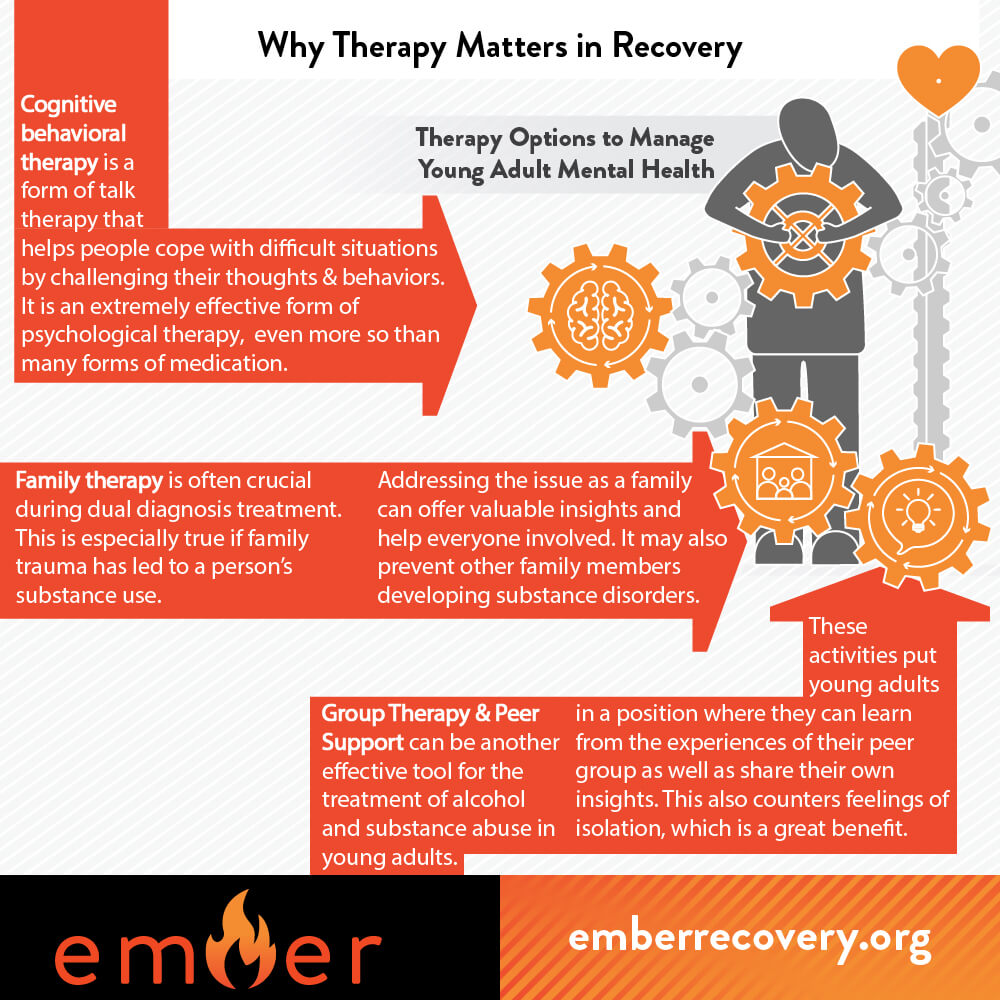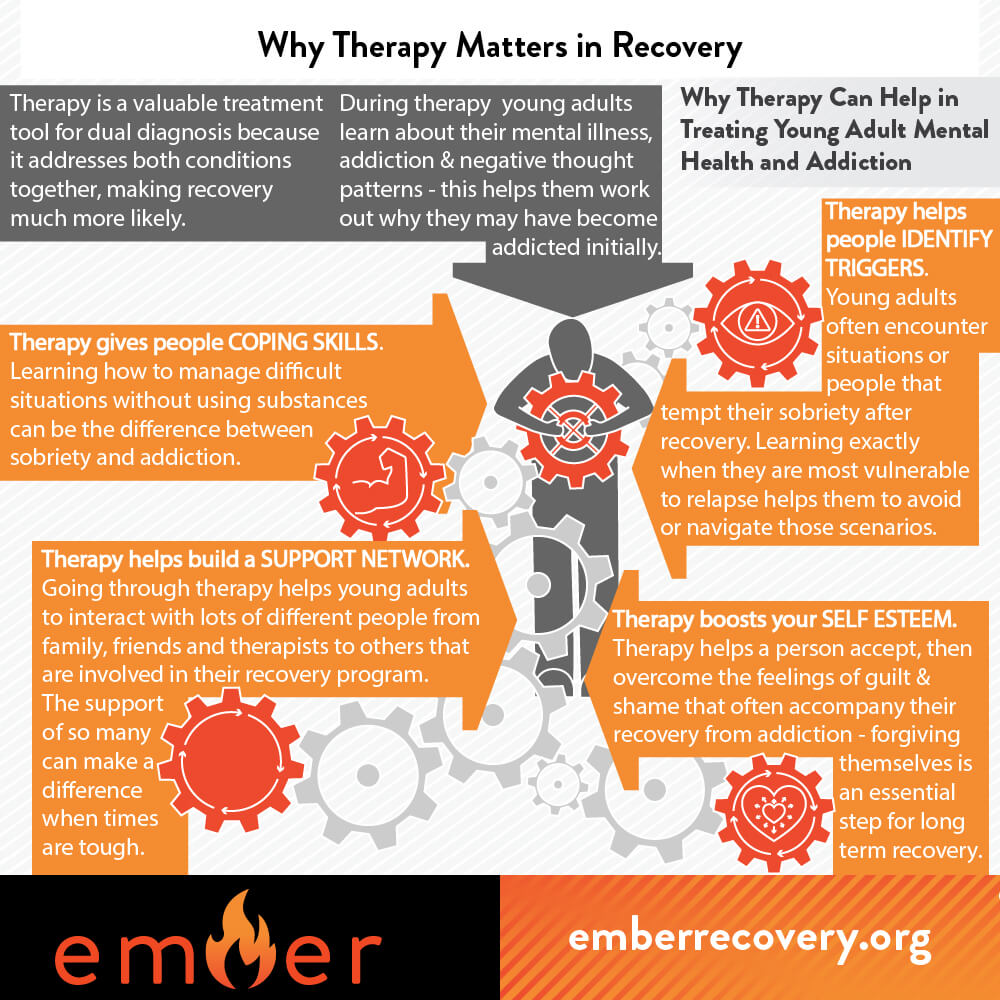The relationship between mental health and addiction is prevalent, with statistics indicating that nearly 14% of all young adults reported having a mental health illness and substance use disorder over the past year.[1] This condition, referred to as a dual diagnosis, requires treating both conditions at once. Failing to do so will not produce an adequate recovery and could result in relapse. Ember Recovery is committed to treating both young adult mental health issues and addiction to achieve the best outcomes. We have detailed ways that therapy can help address these concerns and the different therapy options that are often used.
Treating Young Adult Mental Health and Addiction
Research shows that teens and young adults with mental health problems are at a higher risk of developing a substance addiction.[2] This is because young adults who may be depressed, stressed, or suffer from anxiety may turn to drugs or alcohol to feel better. While this may provide short-lived relief, the underlying issues are still present and need to be addressed.
The same is true for those who may start with an addiction to drugs or alcohol. Using these substances can cause stress and anxiety due to the way they impact the body. Substance use disorders can also lead to depression and loneliness as some people isolate themselves from friends and families as the substances take over their lives.
When underlying mental health issues go unaddressed, substance use can spiral out of control, further intensifying the mental health issues and creating a vicious cycle.
Therapy Options to Manage Young Adult Mental Health
One way to treat mental health issues and addiction is through therapy. Different forms of therapy can be used during dual diagnosis treatment. The Ember Recovery staff utilizes different therapies to help young adults understand their mental health issues and the catalyst for their addiction.
Cognitive Behavioral Therapy
Cognitive behavioral therapy is a type of talk therapy that helps people learn how to cope with difficult situations by challenging their behaviors and thoughts. Research shows that it is one of the most effective forms of psychological therapy and is more effective than certain medications.[3]
Dialectical Behavior Therapy
This type of therapy uses mindfulness to prompt patients to be aware of their current situation and emotional state. Through therapy sessions, patients learn how to control their emotions and reduce self-destructive behaviors.
Family Therapy
Many times, family therapy is necessary during dual diagnosis treatment. This is especially true in instances where family trauma may have led to a young adult’s substance use. Understanding the issue and addressing it as a family can help the healing process for everyone involved. It may also prevent other family members from developing a substance use disorder later in life.
Group Therapy & Peer Support
Group therapy can be another effective tool in the dual diagnosis treatment process. Young adults can hear from their peers experiencing the same issues during group therapy. They can learn from others and provide valuable insight to help others. This process can prevent isolation, which can worsen mental illness.
Why Therapy Can Help in Treating Young Adult Mental Health and Addiction
Therapy can be instrumental in treating mental health and addiction because it addresses both conditions at the same time and helps to identify negative thought patterns. These patterns can contribute to substance use and other harmful behaviors.
During therapy sessions, young adults can gain a better understanding of their addictions and mental illness. They can better grasp what led them to their addiction and how their mental health plays a role.
Develop Coping Skills
Undergoing therapy can also help to develop effective coping skills that can help manage emotions and substance use triggers. Learning what to do during stressful situations can mean the difference between sobriety and addiction.
Build a Support Network
When young adults go through therapy for dual diagnosis, they also build a support network. They have a village behind them that is rooting for their success. This can be family, friends, therapists, and others involved in the treatment program. Knowing you have people who want you to recover and remain sober can help you stay the course when times get tough.
Identify Triggers
Therapy sessions can help to identify triggers to prevent relapse. Many patients experience temptation when they are in the outside world following residential treatment. During therapy sessions, young adults can determine what their triggers are so that they can try to avoid them when their programs are over. They can also learn how to approach people and situations that may tempt their sobriety.
Boost Self-Esteem
Finally, undergoing therapy for dual diagnosis can improve self-esteem as it helps to heal guilt and shame. Many young people may feel ashamed for having a substance use disorder and for the pain it may have caused their families. They can learn how to rebuild trust and work through these emotions through therapy sessions. As they learn how to forgive themselves, they can feel better about who they are and who they are becoming. They can work to rebuild relationships and discover that they are worthy of having healthy relationships with family and friends.
Dual Diagnosis Treatment at Ember Recovery
Ember Recovery provides dual diagnosis treatment for young adults so that they have the best chance at living productive and successful lives. Our treatment focuses on treating both mental health issues and addiction simultaneously. We understand that this is the only way to achieve success.
Our program focuses solely on adolescents and young adults and the specific challenges that this age group faces. We know that when mental health and addiction are treated simultaneously, the symptoms of both can decrease dramatically.
Contact the Ember Recovery staff today to learn more about how our dual diagnosis treatment can help young adults with their mental health issues on the road to sobriety.
Sources:
[1] https://www.hhs.gov/about/news/2023/01/04/samhsa-announces-national-survey-drug-use-health-results-detailing-mental-illness-substance-use-levels-2021.html [2] https://nida.nih.gov/research-topics/co-occurring-disorders-health-conditions [3] https://www.apa.org/ptsd-guideline/patients-and-families/cognitive-behavioral
Andrea Dickerson is a Licensed Therapist and Certified Substance Use Counselor who has worked in behavioral health since 1997. Currently, Andrea is the Director of Behavioral Health, overseeing the Ember residential treatment programs and YSS outpatient counseling clinics throughout Central and North Central Iowa. She became a Motivational Interviewing (MI) trainer in 2006 and provides MI trainings throughout Iowa.
Andrea specializes in working with adolescents and their families and enjoys seeing the family relationships grow through therapy. Andrea is also a CARF International Surveyor, going around North America ensuring behavioral health organizations are meeting required standards.
In her free time, Andrea enjoys cheering on the Iowa Hawkeyes and Chicago Cubs, as well as being an active member of Soroptimist International of the Americas (SIA), a global organization that provides women and girls with access to the education and training they need to achieve economic empowerment. She has been a member of the SI of Des Moines club since 2012 and has been actively involved at the regional level, currently serving as Co-Governor of the Peaks to Plains Region.
Through her involvement in SIA, Andrea has been actively involved in the Dream Programs, coordinating annual Dream It, Be It: Career Support for Girls projects, which give girls the tools they need to achieve their education and career goals, empowering them to break cycles of poverty, violence, and abuse.



